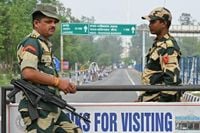On May 7, 2025, tensions escalated dramatically between India and Pakistan as missile strikes erupted in the Kashmir region, marking one of the most intense military confrontations in decades. This conflict, deeply rooted in a long-standing territorial dispute, has once again drawn international attention and concern.
According to reports from the Associated Press and Reuters, India launched an operation dubbed 'Operation Thunder,' targeting nine terrorist facilities it claimed were planning attacks against India. The Indian government asserted that these strikes were precision attacks aimed solely at military targets, emphasizing their restraint by stating that no military facilities were hit during the operation.
In retaliation, Pakistan reported that Indian missiles struck six civilian areas, including two mosques, resulting in at least 26 deaths, among them children, and injuring 46 others. The Pakistani military claimed to have shot down five Indian fighter jets, while Indian sources reported that three jets were downed over Kashmir. The situation escalated further with intense shelling and gunfire reported in the region.
The backdrop to this latest conflict lies in a terrorist attack that occurred on April 22, 2025, in Pahalgam, Indian-administered Kashmir, which claimed the lives of 26 people, primarily targeting Hindu tourists. India has accused Pakistan of orchestrating this attack, a claim that Pakistan vehemently denies, asserting that India is misusing the situation for political purposes.
The Kashmir region has been a flashpoint of conflict since India and Pakistan gained independence from British rule in 1947. Historically, Kashmir, with its population that is over 70% Muslim, has been a contentious area where both nations have laid claim. The region's strategic significance and its rich resources have made it a focal point of military engagements between the two nuclear-armed neighbors.
In the aftermath of the recent missile exchanges, the United Nations Secretary-General, Antonio Guterres, urged both nations to exercise maximum military restraint, stating, "The world cannot afford a military confrontation between India and Pakistan." U.S. President Donald Trump echoed this sentiment, expressing hope for a swift resolution to the conflict. Meanwhile, China also expressed its concerns over India's military actions, calling for both sides to prioritize peace and stability.
Experts suggest that while the immediate conflict is severe, the likelihood of a full-scale war remains low, primarily due to the nuclear capabilities of both countries. Analysts believe that the presence of nuclear weapons acts as a psychological deterrent against escalating military operations. However, the potential for limited military engagements continues to loom large, particularly as nationalist sentiments rise in both nations.
The history of conflict between India and Pakistan is long and fraught with violence. The two countries have fought several wars over Kashmir, with significant military engagements occurring in 1947, 1965, and 1971. The last major military engagement targeting specific areas occurred in 2003, following a ceasefire agreement along the Line of Control (LoC). Since then, however, sporadic violence and terrorist activities have persisted, particularly in Indian-administered Kashmir.
The Modi government in India has taken a hardline stance on Pakistan, particularly after revoking the special status of Jammu and Kashmir in August 2019. This move, which stripped the region of its autonomy under Article 370 of the Indian Constitution, has been met with significant resistance from the local population, many of whom feel marginalized by the central government's policies.
In the wake of the recent hostilities, both nations have ramped up military preparations. India has increased its military presence along the border, while Pakistan has mobilized its forces in response to the perceived threat. The situation remains precarious, with both sides accusing each other of aggression.
As the international community watches closely, the potential for further escalation remains a pressing concern. The longstanding conflict over Kashmir is not only a regional issue but a global one, with implications for peace and stability in South Asia.
In summary, the events of May 7, 2025, represent a significant escalation in the ongoing conflict between India and Pakistan, with both nations firmly entrenched in their respective positions. The world now waits to see how this latest chapter in the Kashmir saga will unfold and whether diplomatic efforts can prevail over military might.




